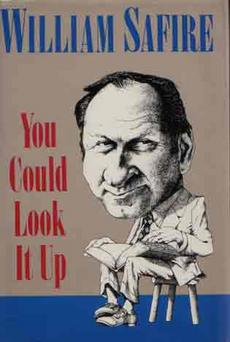 There is nothing we love more on this green Earth than traveling the lay of our great nation and listening to the stupid stuff that people say. We consider ourselves pleasant conversationalists and witty raconteurs, and there is no more lovely an afternoon than one spent chitchatting with our adoring public. But we get maybe one paragraph into one of our really good stories (like, for example, the one about how we wound up eating Cheerios out of Kathy Lee Gifford’s brassiere cups) and—some knucklehead interrupts us. And when they do so, they inevitably say something that utterly annoys us.1
There is nothing we love more on this green Earth than traveling the lay of our great nation and listening to the stupid stuff that people say. We consider ourselves pleasant conversationalists and witty raconteurs, and there is no more lovely an afternoon than one spent chitchatting with our adoring public. But we get maybe one paragraph into one of our really good stories (like, for example, the one about how we wound up eating Cheerios out of Kathy Lee Gifford’s brassiere cups) and—some knucklehead interrupts us. And when they do so, they inevitably say something that utterly annoys us.1
It should be noted that we are rarely upset by the substance of what people say. We are tolerant men, men willing to consider various points of view on the topics of the day. 2 But what we cannot fathom, accept, or endorse are people who say stupid things stupidly. We’re not too hot on people who say smart things stupidly either. And don’t even get us started on people who say anything at all that contains the word “dialogue” used as a verb.
Let us dialogue with you right now: American tongues are a battlefield, and we aim to bring out the heavy-gauge shotguns to defend all that is normal, plain, and unpretentious. William Safire we may not be3, but here is our list of the most irritating, illogical, and cumbersome word abuses and usages out there right now.
The Word “Conflicted,” as in “To Feel Conflict”
Like so much else that’s wrong with today’s world, this disquieting usage must be laid at the feet of people who want to talk about their feelings. There was a time when a person would say, “I’m confused” or “I’m torn” or even the good old “Huh?” Today, however, the pseudo-scientific field of therapy has given us “conflictedness.”4 So, upon arriving back at D.M.T. headquarters, we might hear someone say, “I am conflicted about whether to smoke this bowl now or to wait for Uncle Larry to arrive, because I suspect he will suck it up like a fucking Hoover.” This is a ridiculous way to express doubt or confusion. But more importantly, the person who is “conflicted” seeks to take their common problem and elevate to the level of jargon-requiring intellectual debate. Maybe, maybe, Hamlet was “conflicted” about whether to kill his slutty mom. You? You’re just an attention-grabbing vocab-trendmeister with a problem. Namely that we are going to kick your ass if we ever hear you use the word “conflicted” again.
People Who Say “Often” by Pronouncing the “T”
This is a classic example of something that is stupidly being perpetuated in the name of class or correctness. We cannot sufficiently stress how mind-bogglingly pretentious it is to say “off-Ton,” but at the same time we firmly believe that 90% of the people who do this actually do it out of ignorance. We once asked someone why they said this, and the reply was, “Isn’t that how British people say it?” No. And even if it were, we find aspirations to be/seem British deeply disquieting5. This peculiar combination of attempted superiority and flat-out ignorance seems to us to be a trademark move, the kind of thing that only Americans can really pull off. We’ll concede this: maybe fifteen years ago you had an aunt (“Ahhhhnt”) who said “often” this way, and we excuse her because she used to slip you a fiver on the sly on the occasional Sunday afternoon. Since she passed into the next life, we can no longer tolerate this.
The Word “Liaise,” as in “He Will Liaise with Marketing.”
This cannot cannot cannot be a word. Why? Because it is just damned unpleasant. Which of course never got in the way of such hits as “moist” and “loincloth,” but this unfortunate formulation just rubs a cheese grater on the back of our frontal lobes every time we hear it. But wait!, you protest. The Merriam-Webster Online states that “liaise” is an example of a “back-formation,” through which a new word is extracted from another, perfectly legitimate word on the assumption that it must exist, etymologically, although it does not.6 Coming from “liaison,” of course. Apparently the verb “to edit” is a similar thing, cruelly wrenched from the bowels of “editor,” which is of course a real word. We admire the pluck of those who do such things and feel they offer promising evidence that language is fluid and changes to meet the needs of the interlocutor. But their inventions are often just stupid. This one sure is.
Spelling “Theater” Like This: “Theatre”
If you live in Gloucester or some other British place with a spelling wholly unrelated to its pronunciation, well, you can spell things however you like. (See our tremendous tolerance for the English and our utter intolerance the Anglophilic, Footnote 5, infra.) But here in the good ol’ U.S. of A., where we prize simplicity and down-home wisdom, things will be spelled American-style, thank you. Those who spell “theater” with the “r” and the “e” transposed are doing it for one reason and one reason only: to pathetically attempt to justify their low-wage, artistically suspect “career” in the theater by fancying up a perfectly serviceable word. This, we assert, is the equivalent of forcing the poor word to wear a black turtleneck and black tights, no matter what the weather, and demanding that it smoke Natural American Spirit cigarettes while discussing Brechtian alienation. This may have been fine when you were an undergrad at Wesleyan, but this is the real world. Cut this out or we will send David Mamet and Sam Shepard7 to your house to curse you and wail on you, respectively. Another way of looking at it is this: do doctors spell it “sphinctre” just to make your ass seem a little more classy? No. No they do not.
Goyim Who Use Yiddish Too Much
It pains us to crack this particularly bitter bottle of Manischewitz, since we are exactly these people8. But the cold, hard, week-old kugel of it is that loving that Leo Rosten book and feeling you have acquired a deep appreciation of how well Yiddish expresses sentiments wholly inaccessible to regular, old English does not authorize you to start throwing the shit around like some watchmaker from an E.L. Doctorow novel. We cringe at that scene in A Mighty Wind. If you use any Yiddish beyond “spiel,” which we think has fully crossed over, you are probably out-of-bounds. This doesn’t mean we’re going to stop. Just that we realize how silly we sound. And that you have to stop, because you clearly do not realize.
Next Edition: “Hands-free” cell-phone users who are making it increasingly hard to determine which New Yorkers are merely annoyingly busy and which New Yorkers are talking to themselves like raving lunatics.


